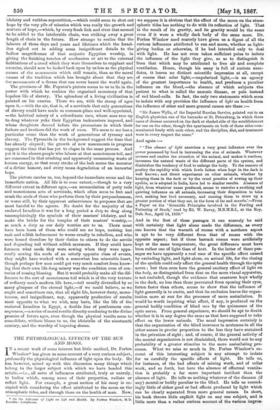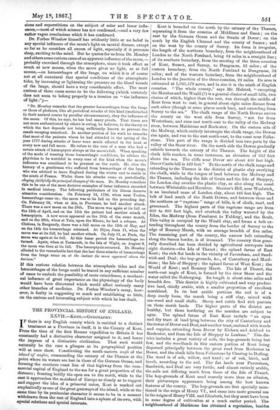THE PHYSIOLOGICAL EFFECTS OF THE SUN
AND MOON.
IN a recent work of some interest but little method, Dr. Forbes I Winslow* has given us some account of a very curious subject, professedly the physiological influence of light upon the body. He has, however, mixed up with this discussion many things which belong to the larger subject with which we have headed this article,—i.e., all sorts of influences attributed, truly or untruly, to bodies which, among some of their properties, radiate or reflect light. For example, a great section of his essay is °c- oupled with considering the effect attributed to the moon on the atmospheric tides, and through those on the health of man. Now, • On the Influence of Light on We and Health. By Forbes London: Longman..
Winslow, M.D.
we suppose it is obvious that the effect of the moon on the atmo- spheric tides has nothing to do with its reflection of light. That is the result of its gravity, and its gravity would be the same even if it were a wholly dark body of the same mass. Dr. Forbes Winslow need scarcely have given us a digest of all the curious influences attributed to sun and moon, whether as light- giving bodies or otherwise, if he had intended only to deal with light. He has not even taken sufficient pains to isolate the influence of the light they give, so as to distinguish it from that which may be attributed to free air and complete ventilation. Hence, though his essay is full of curious anec- dotes, it leaves no distinct scientific impression at all, except of course that solar light,—unpolarized light,—is an agency of the greatest importance to health, and produces a peculiar influence on the blood,—the absence of which subjects the patient to what is called the anasmic disease, or pale instead of red blood-cells. In fact, the only two statements which seem to isolate with any precision the influence of light on health from the influence of other and more general causes are these :— "Sir James Wylie, of the Imperial Russian Service, pointed out to an English physician one of the barracks at St. Petersburg, in which three cases of disease occurred on the dark or shaded side of the establishment for one on the other, though the apartments on both of these aides com- municated freely with each other, and the discipline, diet, and treatment were in every respect the same."
And again :—
" 'The absence of light exercises a very great influence over the power possessed by food in increasing the size of animals. Whatever arouses and excites the attention of the animal, and makes it restless, increases the natural waste of the different parts of the system, and diminishes the tendency of food to enlarge the body. To the rearers of poultry the rapidity with which fowls fatten when kept in the dark is well known ; and direct experiment on other animals, whether by keeping them in the dark or by the oruel practice of sowing up their eyelids, as is adopted in India, have led to similar results. Absence of light, from whatever cause produced, seems to exercise a soothing and quieting influence on all animals, increasing their disposition to take rest, making less food necessary, and causing them to store up greater portion of what they eat, in the form of fat and muscle:—From a Paper on the Scientific Principles involved in the Feeding and Fattening of Stock,' read by Ed. W. Davey, M.B.M.R.L, at the. Roy, Dub. Soc., April 14, 1859."
And in the first of these passages it can scarcely be said with certainty that light alone made the difference, as every one knows that the warmth of rooms with a northern aspect is apt to be very different from that of rooms with the opposite aspect; but if these barrack rooms were artificially kept at the same temperature, the great difference must have been rather one of light than of heat. In the latter of these pas- sages we have apparently a real case of the specific effect caused by excluding light, and light alone, on animal life, for the closing of the eyelids could only affect the general health through the optic nerve ; but then even here the general sanitary effect of light on the body, as distinguished from that on the mere visual apparatus, is not excluded, though the evidence that creatures kept wholly in the dark, no less than those prevented from opening their eyes; fatten faster than others, seems to show that the influence of light generally is to excite, and that its exclusion leaves the organ- ization more at rest for the processes of mere assimilation. It would be worth inquiring what effect, if any, is produced on the general bodily condition of blind men by the quiescence of the optic nerve. From general experience, we should be apt to doubt whether it is in any degree the same as that here supposed to take effect on the lower animals. The usual impression certainly is that the organization of the blind increases in acuteness in all the other senses in precise proportion to the loss they have sustained in the privation of sight; and, of course, if the general activity of the mental organization is not diminished, there would not be any probability of a greater stimulus to the mere assimilating pro- ceases. What we miss so much in Dr. Forbes Winslow's ac- count of this interesting subject is any attempt to isolate for us carefully the specific effects of light. He tells us, for instance, of the bad effects of mining work, and of cellar work, and so forth, but here the absence of effectual ventila- tion is probably a far more important incident than the absence of light. He tells us nothing whatever of the diseases (if any) mental or bodily peculiar to the blind. He tells us exceed. ingly little of either good or bad effects produced by light which can be clearly separated from more general causes. In short, his book throws little explicit light on any one subject, and is
little more than a rather curious account of the various impres- alone and superstitions on the subject of solar and lunar influ- ences,—most of which science has not confirmed,—and a very few rather vague conclusions which it has confirmed.
Dr. Forbes Winslow himself has evidently little or no belief in any special influence of the moon's light on mental disease, except so far as he considers all excess of light, especially if it prevents sleep, exciting to the mind. But he quotes for us from Dr. Moseley and others some carious cases of an apparent influence of the moon, — probably exercised through the atmosphere, since it took effect as much at new moons, when the moon gives no light, as at full moons,—on haemorrhages of the lungs, on which it is of course not at all unnatural that special conditions of the atmospheric tides, by increasing or lightening the pressure on the blood vessels of the lungs, should have a very considerable effect. The most curious of these cases seems to be the following (which certainly does not seem to belong properly to a treatise on " the influence of light :")— " Dr. Moseley remarks that the greater hemorrhages from the lungs or those of plethora, like all periodical attacks of this kind (undisturbed in their natural course by peculiar circumstances), obey the influence of the moon. Of this, he says, he has had many proofs. That there are not more authenticated by others is owing, he believes, to the theory on which the fact depends not being sufficiently known to prevent the result escaping unnoticed. In another portion of his work he remarks that most of the patients whom he had attended in the spring of the year 1777 daring attacks of fever were mach affected in the head at ovary new and full moon. He refers to the case of a man who had a severe attack of htemoptysis always at the moon's full. When speaking of the mode of treating these hemorrhagic conditions, he advises the physician to be watchful in every case of the kind when the moon's influence was considered to be greatest on the earth. Ho cites the history of a gentleman who suffered from hemorrhage of the lungs, who was advised to leave England during the winter and to reside in the south of France. Whilst there his attacks came on periodically, obeying faithfully the principal changes of the moon. Dr. Moseley considers this to be one of the most decisive examples of lunar influence recorded in medical history. The following particulars of his illness deserve attentive consideration. On February 14, 1786, when near Toulon, haemorrhage came on ; the moon was at its fall on the preceding day. .0n February 29, when at Aix, in Provence, he had another attack. There was a new moon on the 28th. The moon was again at its full on the 13th of April, and on the 15th the patient had another attack of htemoptysis. A new moon appeared on the 28th of the same month, and on the 29th, when at Tain, upon the Rhone, he had a relapse. At 'Chalons, in Burgundy, there was a full moon on the 13th of May, and on the 14th his hemorrhage returned. At Dijon, June 11, when the moon was at its full, he had another attack. On July 11, at Paris, the moon was again at its full. At this lunar period the hemorrhage re- turned. Again, when at Yarmouth, in the Isle of Wight, on August 9, the moon was then at its full. The hannoptysis returned. Dr. Moseley alluded to the remarkable fact that the last three attacks of haemorrhage from the lungs came on at the instant the moon appeared above the .horizon."
If this curious relation between the atmospheric tides and the haemorrhages of the lungs could be traced in any sufficient number of cases to exclude the possibility of mere coincidence, a mechani- cal influence of great importance on the physiology of the body would have been discovered which would affect seriously many -other branches of medicine. Dr. Forbes Winslow's essay, how- -ever, is faulty in suggesting so much and establishing so little, -on the curious and interesting subject with which he has dealt.































 Previous page
Previous page